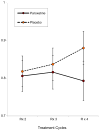Impact of paroxetine on sleep problems in 426 cancer patients receiving chemotherapy: a trial from the University of Rochester Cancer Center Community Clinical Oncology Program
- PMID: 22858235
- PMCID: PMC3664933
- DOI: 10.1016/j.sleep.2012.06.001
Impact of paroxetine on sleep problems in 426 cancer patients receiving chemotherapy: a trial from the University of Rochester Cancer Center Community Clinical Oncology Program
Abstract
Background: Sleep problems are a frequent distressing symptom in cancer patients, yet little is known about their treatment. Sleep problems and depression frequently co-occur, leading healthcare professionals to treat depression with the expectation that sleep problems will also improve. The purpose of this study was to compare the effect of paroxetine to placebo on sleep problems via a secondary data analysis of a RCT designed to compare the effects of paroxetine to placebo on fatigue in cancer patients undergoing chemotherapy. A previously published report found a significant effect of paroxetine on depression in this cohort.
Methods: A total of 426 patients were randomized following Cycle 2 of chemotherapy to receive either 20mg of paroxetine or placebo. Sleep problems were assessed using questions from the Hamilton Depression Inventory three times during chemotherapy.
Results: A total of 217 patients received paroxetine and 209 received placebo. Significantly fewer patients taking paroxetine reported sleep problems compared to patients on placebo (Paroxetine 79% versus Placebo 88%; p<0.05). These differences remained significant even after controlling for baseline sleep problems and depression (p<0.05).
Conclusion: Paroxetine had a significant benefit on sleep problems in both depressed and non-depressed cancer patients. However, rates of sleep problems remained high even among those effectively treated for depression with paroxetine. There is a need to develop and deliver sleep-specific interventions to effectively treat sleep-related side effects of cancer treatments. These findings suggest that sleep problems and depression are prevalent and co-morbid. Cancer progression, its response to treatment, and overall patient survival are intricately linked to host factors, such as inflammatory response and circadian rhythms, including sleep/wake cycles. Sleep problems and depression are modifiable host factors that can influence inflammation and impact cancer progression and quality of life. Future research should focus on discovering the pathogenesis of sleep dysregulation and depression in cancer so that better treatment approaches can be developed to ameliorate these symptoms.
Published by Elsevier B.V.
Conflict of interest statement
The ICMJE Uniform Disclosure Form for Potential Conflict of Interest associated with this article can be viewed by clicking on the following link: doi:10.1016/j.sleep.2012.06.001.
Figures
References
-
- Parker KP, Bliwise DL, Ribeiro M, et al. Sleep/wake patterns of individuals with advanced cancer measured by ambulatory polysomnography. J Clin Oncol. 2008;26:2464–72. - PubMed
-
- Savard J, Morin CM. Insomnia in the context of cancer: A review of a neglected problem. J Clin Oncol. 2001;19:895–908. - PubMed
-
- Byar KL, Berger AM, Bakken SL, Cetak MA. Impact of adjuvant breast cancer chemotherapy on fatigue, other symptoms, and quality of life. Oncol Nurs Forum. 2006;33:E18–26. - PubMed
Publication types
MeSH terms
Substances
Grants and funding
LinkOut - more resources
Full Text Sources
Medical



